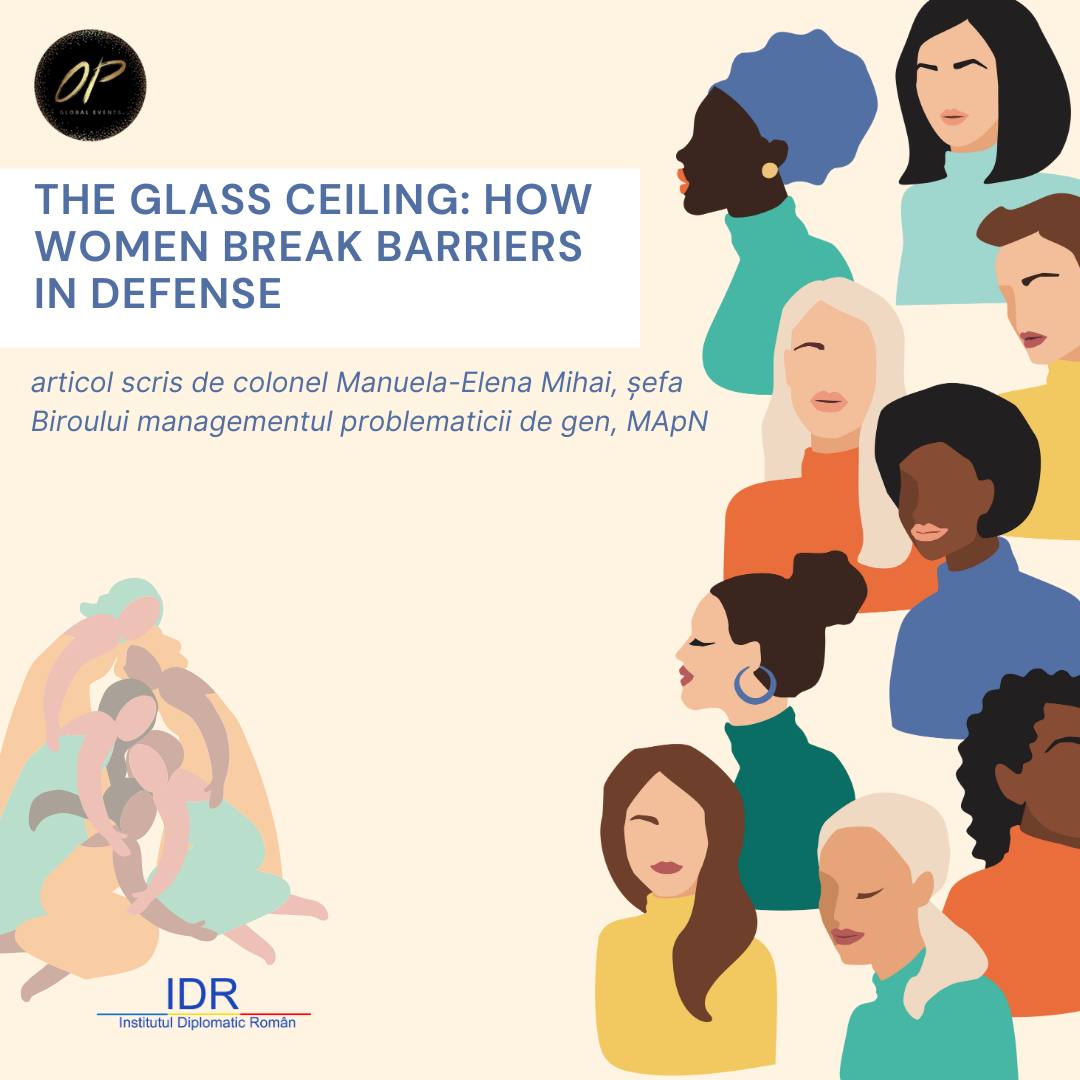The Glass Ceiling: How Women Break Barriers in Defense, 31 oct. 2024 31.10.2024

The Glass Ceiling: How Women Break Barriers in Defense
By Colonel Manuela-Elena Mihai, Chief of the Gender Management Office at the Ministry of National Defense, Romania
Discover how Colonel Manuela-Elena Mihai turned a career challenge into a groundbreaking movement for women’s peace and security.

Where it all began ... eight years ago, I was offered the biggest challenge of my life.
I was a legal advisor for NATO headquarters in Bucharest when I was offered the position of Head of the Gender Management Office within the Romanian Ministry of National Defense (MoND). Curious and eager for knowledge, I researched and realized that our country needed to do more in this regard. That's how I got here.
It took me a good few months to familiarize myself with international law and make an action plan for the MoND. This ultimately involved the entire national defense, public order, and national security system because I later learned that the tasks associated with the job concerned not only the MoND but extended to the national level.
This process eventually led to my work with the Women, Peace, and Security (WPS) Agenda.
What is the Women, Peace, and Security (WPS) agenda?

The WPS agenda concerns an ordinary, stable world, peace, equality, and non-violence. It involves eradicating all forms of sexual and gender-based violence, protecting women and girls in conflict zones from such violence, ensuring all the conditions for a decent life in refugee camps, and, last but not least, promoting women to leadership positions in peace negotiation processes and peacekeeping operations.
Why the Women’s Peace and Security agenda?
Because we live in a world where 50% of the population is women, and we continue to be underrepresented. Every day, we face cases of violence and harassment, which must be stopped because women bring balance and harmony and demonstrate empathy and understanding.
The National Implementation Group (NIG).

Romania has taken significant steps towards implementing the WPS agenda. This progress is thanks to a collaborative group of dedicated professionals representing critical national institutions and the constant support from the National Agency for Equal Opportunities Between Women and Men (NAEO). From this collaboration, the National Implementation Group (NIG) came into being. I was elected the group's president, and the NAEO representative, Ms. Gianina Dimitrescu, was vice president.
We organized regular working meetings to discuss various situations and, most importantly, developed Romania’s National Strategy and Action Plan to implement United Nations Security Council Resolution 1325 (2000), focusing on women’s roles in peace and security. This plan, covering 2020-2023, was a crucial step in aligning Romania with international efforts on gender equality and was formally approved by Government Decision No. 561/2020.

In July 2024, Romania took another significant step by approving the updated National Strategy and Action Plan for 2024-2028, reinforcing our commitment to advancing the Women, Peace, and Security (WPS) agenda.
What makes our approach particularly meaningful is that we didn’t stop at creating policy documents. We actively ensured their implementation, with each participating institution submitting detailed annual reports on their progress. The Gender Management Office compiled these reports into summaries published online to maintain complete transparency and accountability.
Co-chairing the WPS focal points network.
The seriousness, professionalism, and concrete results I have shown qualify me for the honorable position of co-chair of the WPS Focal Points Network, together with my US counterpart, Katrina Fotovat. With the permanent support of Harriette Williams Bright from UN Women, we organized a series of large-scale activities in 2023 in Washington, D.C., New York, and Bucharest. In 2024, I ensured the continuation of the co-chairship, this time with activities in the USA, Romania, Switzerland, and South Africa.
Cooperation with Civil Society.

To effectively implement the WPS agenda, inter-institutional cooperation and partnerships with civil society and academia are essential. Therefore, we have organized a series of projects to promote female leadership in various fields, including defense, medicine, banking, entrepreneurship, and others. Female leaders have been involved in sharing relevant information and identifying best practices in each respective field.
All the mentioned achievements are the result of teamwork. None of this would have been possible without the support of my colleagues and the MoND leadership, who understood the need to develop this field in our times.
The promotion of female leadership and the eradication of any form of gender violence are part of the democratic values promoted by the Romanian Government.

After graduating from the Law School of the “Lucian Blaga” University in Sibiu,
Colonel Manuela-Elena Mihai started her career in Brașov as a legal advisor. In 2015, she was appointed legal advisor in the NATO Force Integration Unit (NFIU), becoming the first legal advisor of any NATO Headquarters established in Bucharest.
In 2018, she became the first Chief of the Gender Management Office within the Department for Parliament Liaison and Personnel Welfare. She was later designated the National Focal Point for the Women, Peace, and Security agenda.
Additionally, she was elected Chair of the National Implementation Group of the National Strategy and the National Action Plan “Women, Peace and Security.”
